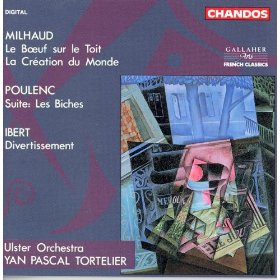20th Century French Orchestral Works
View record and artist detailsRecord and Artist Details
Composer or Director: Darius Milhaud, Jacques (François Antoine) Ibert, Francis Poulenc
Genre:
Orchestral
Label: Chandos
Magazine Review Date: 9/1992
Media Format: CD or Download
Media Runtime: 68
Mastering:
DDD
Catalogue Number: CHAN9023

Tracks:
| Composition | Artist Credit |
|---|---|
| (Les) Biches |
Francis Poulenc, Composer
Francis Poulenc, Composer Ulster Orchestra Yan Pascal Tortelier, Conductor |
| Divertissement |
Jacques (François Antoine) Ibert, Composer
Jacques (François Antoine) Ibert, Composer Ulster Orchestra Yan Pascal Tortelier, Conductor |
| (Le) Boeuf sur le toit, '(The) Bull on the Roof' |
Darius Milhaud, Composer
Darius Milhaud, Composer Ulster Orchestra Yan Pascal Tortelier, Conductor |
| (La) Création du monde |
Darius Milhaud, Composer
Darius Milhaud, Composer Ulster Orchestra Yan Pascal Tortelier, Conductor |
Author: Christopher Headington
This programme of 1920s French music is in the hands of a conductor who gets right into the spirit of it, and plenty of spirit there is too. Apart from the Ibert, this is ballet music, and that work too originated as a theatre piece, having been incidental music for Eugene Labiche's farce The Italian Straw Hat. Poulenc's unfailingly fresh and bouncy suite from Les biches is very enjoyable although Chandos's warm and resonant recording takes some of the edge off the trumpet tone that is so central to the writing. The geniality of it all makes one forget that this is remarkable music in which (as Christopher Palmer's booklet essay points out) the twentieth-century French composer evokes eighteenth-century fetes galantes through the eyes of that greatest of nineteenth-century ballet composers, Tchaikovsky.
Ibert's Divertissement is about the most uproarious music I know, funny in an unbuttoned way that is wholly Gallic but unlike the Poulenc. This also goes well, and the relatively small orchestra (which always sounds bigger than it is and includes a piano) is clearly one of fine players. The gorgeously vulgar trombone in the Waltz and the frantic police whistle in the finale are straight out of Inspector Clouseau country and, as played here, could make the most hardened listener laugh out loud.
The two Milhaud ballet scores are different again, and Le boeuf sur le toit reminds us that of all Les Six he was, in certain moods, closest to the Satie of Parade and Relache—that is, to Parisian 1920s chic as understood by Cocteau and Diaghilev. When the composer came to see it in 1920 at the London Coliseum, he also heard a New York jazz orchestra playing at the Hammersmith Palais de Danse; this experience, together with a later New Orleans one of musicians performing (as he later put it) ''from the darkest corners of the negro soul'', prompted the composition of his La creation du monde, in which a deep-rooted African voice seems to speak through jazz and western instruments including the alto saxophone. Tortelier and his orchestra are again inside this strange but powerful work which is probably Milhaud's masterpiece. Altogether this is a most desirable issue.'
Ibert's Divertissement is about the most uproarious music I know, funny in an unbuttoned way that is wholly Gallic but unlike the Poulenc. This also goes well, and the relatively small orchestra (which always sounds bigger than it is and includes a piano) is clearly one of fine players. The gorgeously vulgar trombone in the Waltz and the frantic police whistle in the finale are straight out of Inspector Clouseau country and, as played here, could make the most hardened listener laugh out loud.
The two Milhaud ballet scores are different again, and Le boeuf sur le toit reminds us that of all Les Six he was, in certain moods, closest to the Satie of Parade and Relache—that is, to Parisian 1920s chic as understood by Cocteau and Diaghilev. When the composer came to see it in 1920 at the London Coliseum, he also heard a New York jazz orchestra playing at the Hammersmith Palais de Danse; this experience, together with a later New Orleans one of musicians performing (as he later put it) ''from the darkest corners of the negro soul'', prompted the composition of his La creation du monde, in which a deep-rooted African voice seems to speak through jazz and western instruments including the alto saxophone. Tortelier and his orchestra are again inside this strange but powerful work which is probably Milhaud's masterpiece. Altogether this is a most desirable issue.'
Discover the world's largest classical music catalogue with Presto Music.

Gramophone Digital Club
- Digital Edition
- Digital Archive
- Reviews Database
- Full website access
From £8.75 / month
Subscribe
Gramophone Full Club
- Print Edition
- Digital Edition
- Digital Archive
- Reviews Database
- Full website access
From £11.00 / month
Subscribe
If you are a library, university or other organisation that would be interested in an institutional subscription to Gramophone please click here for further information.




